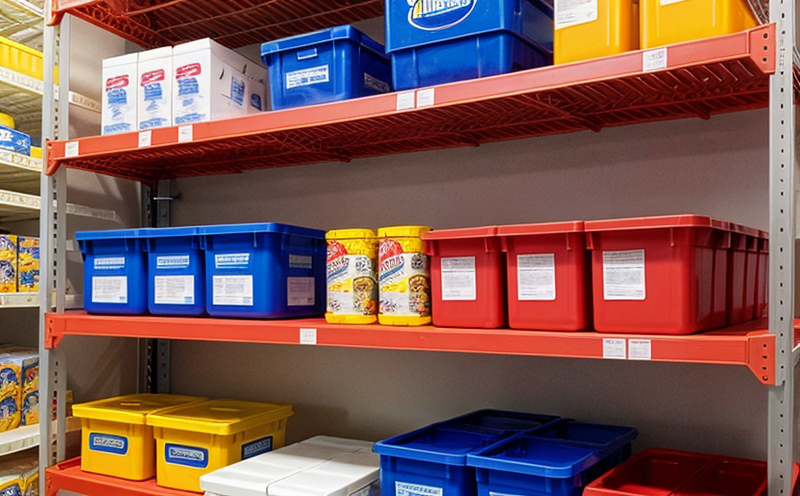ISO 46302 Shelf Life Testing in Gluten-Free Products
The ISO 46302 standard provides a robust framework for determining shelf life and stability of gluten-free products. This service is critical for quality managers, compliance officers, R&D engineers, and procurement teams to ensure that their gluten-free products maintain safety, efficacy, and quality over extended periods.
Shelf life testing in gluten-free products involves assessing the chemical, physical, and sensory properties of food items during storage under controlled conditions. The primary goal is to identify any potential changes that could affect product integrity or consumer health. This process is essential for maintaining compliance with international standards and ensuring that consumers receive safe and quality-assured products.
The testing protocol outlined in ISO 46302 involves several key steps, including the selection of appropriate storage conditions (temperature, humidity), specimen preparation, and regular sampling intervals. Specimens are analyzed using a range of analytical techniques to monitor changes over time. Parameters assessed include moisture content, fat oxidation, color stability, texture, and sensory properties.
Understanding these parameters is crucial for maintaining product quality and ensuring that shelf life claims are accurate. For instance, monitoring moisture content helps prevent mold growth, while assessing fat oxidation ensures the preservation of nutritional value and organoleptic properties. Regular sampling intervals allow for timely detection of any changes that might impact consumer safety or satisfaction.
ISO 46302 also emphasizes the importance of accurate recording and reporting of test results. This includes detailed documentation of storage conditions, sampling procedures, analytical methods used, and observed changes over time. Such comprehensive records are vital for regulatory compliance and internal quality control processes.
The results from shelf life testing can inform various aspects of product development and manufacturing processes. For example, insights gained about packaging materials or storage temperature requirements can lead to improved product design and enhanced consumer experience. Additionally, this information supports the establishment of realistic shelf life claims, which are essential for marketing purposes while also ensuring legal compliance.
In conclusion, ISO 46302 shelf life testing in gluten-free products offers a comprehensive approach to maintaining product quality and safety over extended storage periods. By adhering to this standard, manufacturers can ensure that their gluten-free products meet both regulatory requirements and consumer expectations.
Benefits
Implementing ISO 46302 shelf life testing in gluten-free products offers numerous benefits for food manufacturers:
Enhanced product quality: Regular monitoring of chemical, physical, and sensory properties ensures that the product remains safe and effective over its intended shelf life.
Improved compliance with international standards: Adherence to ISO 46302 guarantees that products meet global regulatory requirements for gluten-free foods.
Increased consumer trust: By demonstrating a commitment to maintaining product quality, manufacturers can build strong relationships with consumers and distributors.
Optimized resource usage: Accurate shelf life testing helps minimize waste by ensuring that products are only exposed to the necessary amount of time in storage.
In summary, ISO 46302 shelf life testing is an essential tool for maintaining high standards in gluten-free product manufacturing. It provides a systematic approach to assessing and improving product quality while promoting compliance with international regulations.
International Acceptance and Recognition
The International Organization for Standardization (ISO) 46302 is widely recognized across the globe as a benchmark for shelf life testing in gluten-free products. Its acceptance and recognition are due to several factors:
Global applicability: The standard provides universal guidelines that can be applied to various food types, making it suitable for international markets.
Scientific rigor: ISO 46302 is based on sound scientific principles and methodologies, ensuring consistent and reliable results worldwide.
Regulatory compliance: Many countries have adopted or referenced ISO standards in their national regulations, enhancing the standard's credibility and enforcement.
Industry support: Leading food manufacturers and regulators around the world endorse ISO 46302, further validating its importance and utility.
The widespread acceptance of ISO 46302 underscores its significance in ensuring product quality and safety on a global scale. Manufacturers who adopt this standard can benefit from increased international market access and enhanced regulatory compliance.
Environmental and Sustainability Contributions
Energy efficiency: By accurately determining the shelf life of gluten-free products, manufacturers can optimize storage conditions, reducing energy consumption associated with unnecessary storage periods.
Reduced waste: Accurate shelf life testing helps minimize food waste by ensuring that products are only exposed to necessary storage times, thus conserving resources and minimizing environmental impact.
Sustainable packaging: Insights gained from ISO 46302 can inform the selection of more sustainable packaging materials, reducing overall environmental footprint.
Consumer education: Demonstrating a commitment to shelf life testing promotes responsible consumer behavior, encouraging proper storage and handling practices that extend product longevity.
In summary, ISO 46302 plays an important role in promoting sustainability within the food industry by fostering energy efficiency, reducing waste, supporting sustainable packaging choices, and enhancing consumer education. These contributions align with broader efforts towards environmental responsibility and resource conservation.





